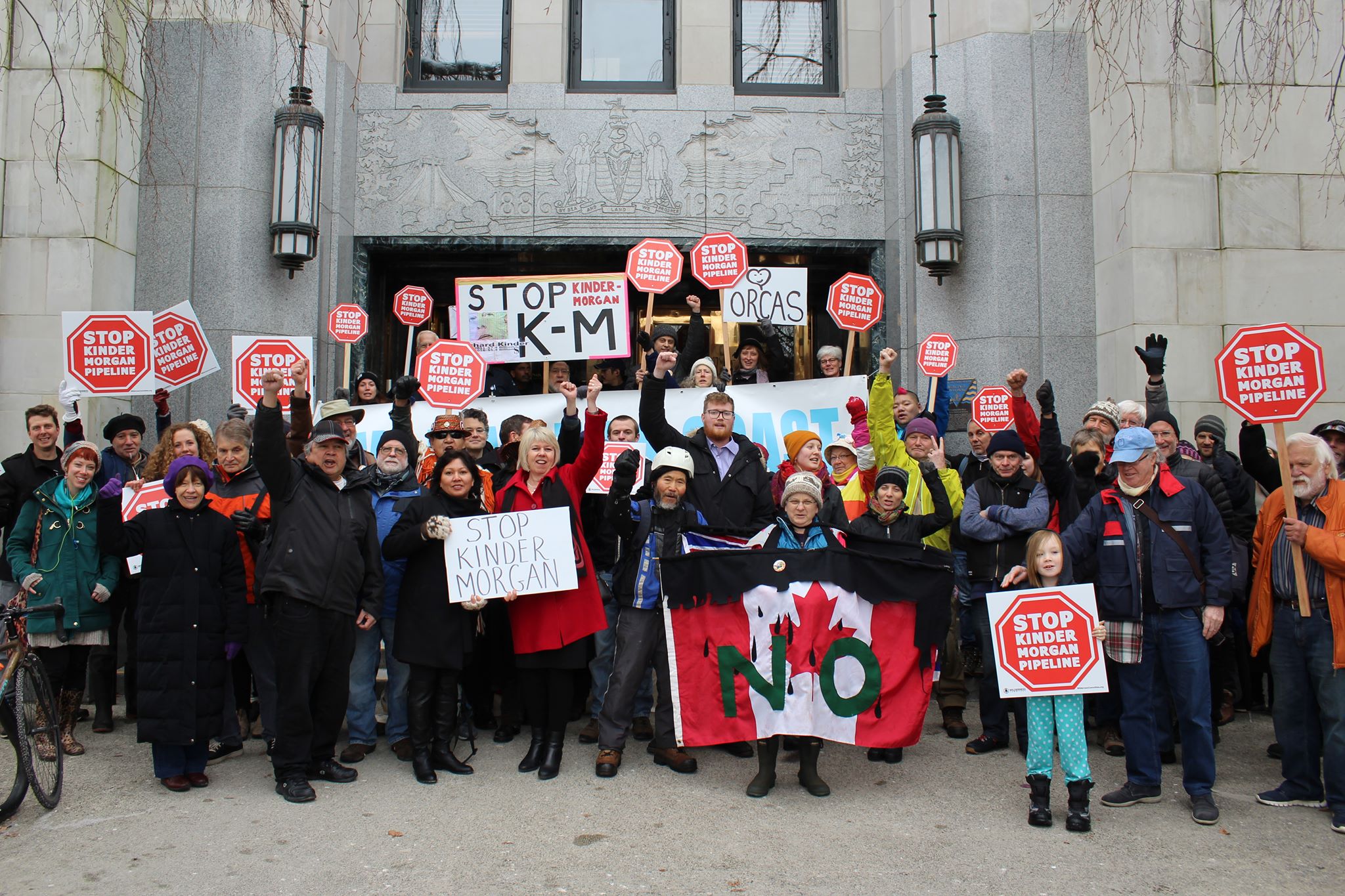While the provincial and federal governments may have announced their support for Kinder Morgan’s Trans Mountain pipeline, opponents are continuing to strengthen their fight against the project in court.
From whales to rights to conflicts of interest, the reasons for legal challenges are vast and don’t appear to be slowing down. Just last week, Vancouver city councillor Adriane Carr put forward a motion to request judicial review of the province’s environmental approval of Trans Mountain.
“If there is real and genuine consultation with First Nations and real and genuine consultation with the public…I believe the outcome will be a no,” said Carr, in a press conference outside Vancouver’s city hall. “No environmental permit, no building of Kinder Morgan’s pipeline and thus a better future for all of us.”
The motion suggested that First Nations groups were not adequately consulted and there was little assessment of adverse effects on marine life. City council will hear speakers on Feb. 22. In the meantime, however, many other legal challenges are moving forward.
PIPE UP and the Province of B.C.
On Jan. 31, Democracy Watch and the PIPE UP Network applied for a B.C. Supreme Court order to challenge the province’s approval of Trans Mountain. According to these groups, Kinder Morgan and pipeline-connected companies donated more than $750,000 to the B.C. Liberal Party, creating a conflict of interest in Premier Christy Clark’s support of the project.
When asked to comment on this legal challenge, a representative from the Ministry of Environment said the province conducted its own environmental assessment and took the NEB’s decision into consideration.
“The information that the ultimate decisions are based on was gathered by professional staff, whose analysis and recommendations were then forwarded to elected officials. The final decision making process is also strictly outlined in statutes,” they said.
Even so, PIPE UP Network says the decision to approve the project is still a conflict of interest.
“The fate of the Trans Mountain pipeline, which puts our oceans and rivers at extreme risk, should be decided by people who do not have their hands in the pockets of Kinder Morgan and pipeline-connected companies,” said Lynn Perrin, director of PIPE UP Network.
What about whales?
For Living Oceans Society and Raincoast Conservation, the project’s issue lies with the National Energy Board’s assessment of Trans Mountain.
With support from Ecojustice lawyers, the groups filed a request for judicial review with the Federal Court of Appeal in late December. Dyna Tuytel, an Ecojustice lawyer, told rabble the federal government should not have relied on the NEB’s assessment because it did not consider the impacts the project would have on marine life, particularly on B.C.’s southern coast whale population
“The project would mean over 400 tankers a year travelling through the southern residents’ critical habitat on their way to and from Westridge Terminal in Burnaby,” she said.
Tuytel said that the tankers bring three main risks to the local whale population: increased ocean noise affecting their ability to communicate and hunt, shortage of food supply and contamination of the ocean from potential oil spills.
Currently, Tuytel said the court is considering both parties’ submissions on the case before moving ahead.
First Nations call for consultation
Multiple First Nations groups including Tsleil-Waututh, Squamish and Coldwater nations have also taken legal action against Trans Mountain and say they were not properly consulted on the pipeline project.
“The federal government’s consultation process was disappointingly flawed,” said Chief Maureen Thomas of Tsleil-Waututh Nation. “We do not consent to the Kinder Morgan pipeline project in our territory. We are asking the court to overturn the federal cabinet’s decision to approve this project.”
Eugene Kung, a staff lawyer with West Coast Environmental Law works closely with the Tsleil-Waututh’s Sacred Trust — an initiative to stop Trans Mountain. He says their case is particularly important because it’s an issue of constitutional rights.
“First Nations have very unique rights, constitutionally protected rights in Canada,” he said. “That is an ongoing and developing area of law which has had a very clear trajectory of increasing and entrenching those rights.”
Yet as all of these legal challenges progress, Trans Mountain appears unphased.
“As cases make their way through the courts, we are continuing to move forward with [the] project — planning, permitting, engagement and design — in order to meet conditions and be ready to begin construction in September 2017,” Lisa Clement, a media relations spokesperson for Trans Mountain told rabble.
Even so, Kung believes that legal challenges coupled with community support can overturn a federal decision and stop a pipeline.
“I think everyone on either side would have been anticipating and expecting legal challenges,” he said. “The legal challenges that have been filed were not necessarily a surprise but certainly are a really important part of the fight.”
Alyse Kotyk is a Vancouver-based writer and editor with a passion for social justice and storytelling. She completed her undergraduate degree at Queen’s University and studies journalism at Langara College. Alyse was the editor of Servants Quarters and has written for the Queen’s News Centre, Quietly Media and the Vancouver Observer. She was rabble’s 2015-16 news intern.
Like this article? Please chip in to keep stories like these coming.
Image: Facebook/Stop Kinder Morgan




